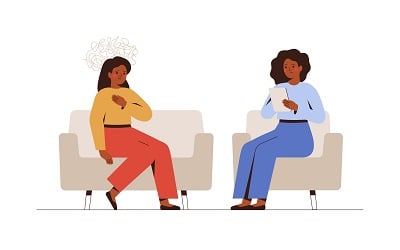High Demand for Therapists Begs the Question: What Do We Do Now? ADAA Executive Director Addresses Concerns
High Demand for Therapists Begs the Question: What Do We Do Now? ADAA Executive Director Addresses Concerns

Treating anxiety, depression and related disorders requires a comprehensive and well-rounded approach. Therapy is an essential part of that strategy, and it concerns me to know that more and more people, already suffering, are having difficulty finding therapists. A Washington Post article (Nov 2022), one of many we see in the news these days unfortunately, on therapists being unable to meet demand as anxiety and depression linger got me thinking about how we can – and do - help to alleviate this alarming imbalance. Sadly, the workforce shortage in mental healthcare is not something new or surprising to me and others in the mental health field.
There is no substitute for receiving mental health treatment and care from a licensed professional but in the crisis we find ourselves now, it becomes even more crucial for the health care ecosystem and all who touch it to take an interdisciplinary approach—one that incorporates education, resources, science, and information on the most up-to-date evidence-based treatments and practices.
At the Anxiety and Depression Association of America (ADAA), and other nonprofits, we know the importance of mental health support and creating communities where both the public and professionals can gain, and provide more knowledge and insight, while accessing and promoting scientific information and practices. As an organization that has both a public and professional focus, we understand that advancements in mental health care and treatment must come from an alignment of forces. One of those forces, of course, is therapy. Yet here we are, as the article points out, at a time when demand far outweighs supply and unlike restocking the shelves of a supermarket, we cannot expeditiously avail the field of more therapists. That endeavor will take years. Even with our early career program where we help and partner with young mental health professionals to gain the knowledge and mentoring they need to become the next generation of providers that the country critically requires.
What we can do in the meantime is leverage and amplify the tools and evidence-based resources we do have to support those in need. ADAA provides help through a comprehensive and inclusive platform of expert knowledge and technology. Through free resources, professionally reviewed content, public and professional blogs, webinars, newsletters, mental health apps, tips, and videos, ADAA offers the public and those struggling with mental health issues a multitude of valuable information on mental health conditions, treatments, education, and support. Our free and anonymous peer-to-peer community, available in English and Spanish, allows for members of the public to communicate and share with each other on their own or loved ones’ struggles and triumphs with mental health and has proved a tremendous support for so many.
As an international membership organization grounded in scientifically accepted protocols, we have a vast amount of human resources and expertise at our disposal. Technology is essential but nothing replaces the human element in mental health treatment and with a network of diverse professional members that includes clinicians, researchers, therapists, doctors, students, and trainees, we ensure the broader scientific community collaborates to bring current research and treatment back to us, and you. With our annual conference and continuing education for therapists and researchers, our members can take advantage of ongoing opportunities for learning and growing. In addition, our members contribute blogs, host webinars, review content, and participate in peer-led professional groups through our platform. We also feature articles, books, and research that our members have written or are involved in and make all that available to the public.
Supporting and using reliable mental health resources and evidence-based nonprofit organizations like ADAA has never been more imperative than it is right now. The mental health workforce is under pressure. We know that and we know that we cannot do anything immediately to relieve that pressure, but we can prevent it from augmenting as it simmers back to a more manageable state. One thing we have been working on is a new and enhanced Find A Therapist tool which will launch early next year but even that is not going to instantly populate the therapy workforce. However, we can support the workforce by relying on some of the other supports in the mental health field.
Bridging the gap between mental health professionals and the people who need them right now is going to take some creative and non-traditional thinking. At ADAA, we are not only thinking about it but acting on it. The need is there, pressing against us all. Over 9% of American adults suffer from a depressive illness each year. Finding a therapist is important but so too is finding comprehensive access to the right resources, education, information, and support. Our ADAA members donate their time to develop the resources that we can offer for free to the public. And for their collaboration and commitment to ADAA, we are most grateful.












